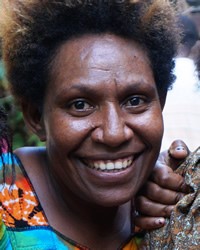Kosena language speakers live on the border of Okapa District and Kainantu District in the Eastern Highlands Province, Papua New Guinea. Oral history relates that their ancestors originated from the Tairora village and initially settled in the rich Oiyana valley between Onamuga and Ontenu village. Their ancestors had to move camp from Oiyana, after having settled there for a very long time, due to tribal warfare and involvement of colonial rule through Luluai and Tultuls and village policing to control law and order (German New Guinea Territory).
Their ancestors initially referred to and known as Irafo people migrated to current site after a short stay in Onamuga. They could not stay long at the new location due to their reputation as fierce warriors who were viewed as trouble makers. They moved camp after instigating trouble with neighboring tribes and moved down to Arora villages and settled there for some time. While there, they made several scouting expeditions back to the current site to weigh out possibility of reprisal attacks on occupants, mostly Fomu people and return and reclaim their land. They eventually mustered enough courage to fight off the Fomu people and reclaim the current site. The current generation, due to its association with the Arora, Sefuna and part of Awiyana people adopted the name Kosena, although the history of how the name evolved remains vague to this day.
The current location for Kosena language speakers is along the border of Okapa and Kainantu district in Eastern Highlands Province, Papua New Guinea. Some of the language speakers, especially from Arora, Sefuna and Awiyana are located towards the southern part of Okapa district.
The current lifestyle of the people is a mix of subsistence farming, using traditional and modern agricultural practices. The main staple food eaten all year round is English potato or kaukau. They grow vegetables such as cabbage, broccoli, tomatoes, garlic and potato.
Many traditional cultures and practices have been done away with or are in the process of dying out as the people embrace Christianity and socio-economic changes brought about by the independence.
These language speakers are declining at an alarming rate. This is probably the last generation to know most of their cultural heritage including pure language. The new generation cannot articulate well and speak Pidgin English with many substitution of phrases in between. A Tokples (native mother tongue) school needs to be set up to preserve this language.
Scripture Prayers for the Kosena in Papua New Guinea.
| Profile Source: Eliud Uwasenko |










